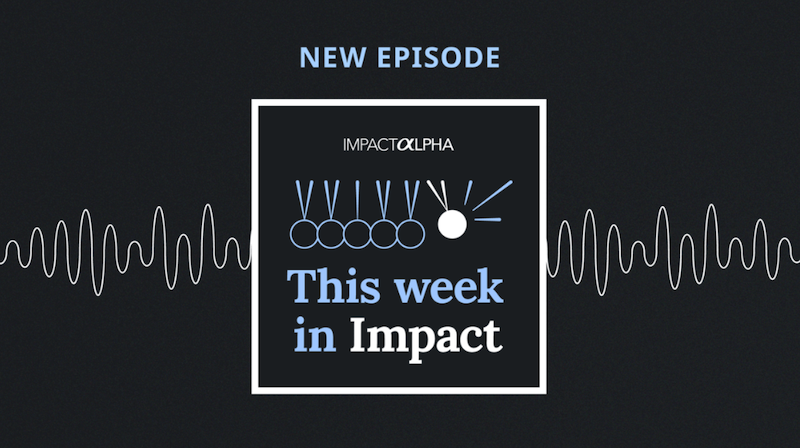Editor’s note: ImpactAlpha has partnered with HIP Investor to highlight upcoming bond issues with social and/or environmental significance. Disclaimer: Nothing in this post or on ImpactAlpha.com shall constitute an offer to sell or solicitation of an offer to buy bonds.
- CUSIP bond identifier: 59447NBE5
- Issuer: Michigan Finance Authority
- Obligor: Henry Ford Health System (HFHS)
- Muni sector: Healthcare
- Closing date: 04/02/2024
- Bond amount: $52.9 million for the above CUSIP maturing in 2057; all issuances in the series total $249.3 million
- Coupon: 5.5%
- HIP Impact Rating: 68.6 connoting “net positive” on a 100-point scale
- Opportunity Zones located in the issuing entity: 94 zones covering 132,986 residents
- Climate Threat Resilience Rating: 69.5 on a 100 point scale, connoting lesser climate risk
The Henry Ford Health System is a not-for-profit, academic, integrated health system founded in 1915. It is composed of five acute-care hospitals, three behavioral health facilities, one health plan, and more than 250 care sites including a medical center, same-day and urgent care clinics, pharmacies, eye care facilities, and other health operations. HFHS employs 33,000 people, including nearly 6,000 physicians and researchers.
The Michigan Finance Authority recently issued a green bond series of nearly $250 million to finance the construction of a central utility plant for HFHS and finance other improvements for the facilities’ water heating needs. The plant will be developed on HFHS’s south campus in Detroit.
HFHS represents a leader in advancing sustainability within the healthcare sector. Its objectives are multifaceted, aiming to reduce operational costs while slashing Scope 1 and 2 greenhouse gas emissions by 50% by 2030 and achieve carbon neutrality by 2040. HFHS has also long-term power purchase agreements with public utility companies to transition its facilities to 100% renewable electricity by 2029.
It is also committed to rectifying environmental injustices and enhancing the health and wellbeing of patients, team members, and the communities it serves. HFHS is aiming to halve the waste it sends to landfills against a 2022 baseline, eliminate hazardous chemicals from facilities and clinical products, and source 30% of its food from local sustainable providers.
By embracing green initiatives such as energy efficiency, waste reduction, and eco-friendly practices, HFHS shows that it is prioritizing responsible stewardship of resources. The system sees these measures as a way of reducing operational costs while enhancing community well-being by minimizing pollution. Such initiatives could inspire innovation and collaboration within the healthcare sector, driving improved sustainable practices.
Electric transition
The planned water heating and cooling plant will improve the energy efficiency and carbon footprint of the health system by going electric. The plant’s heating and cooling equipment would use a closed-loop heating and chilling system using electricity from the grid and power from HFHS’s wind and solar contracts.
For emergencies, diesel fuel would power backup generators and dual-fuel boilers.
The project also considers social factors, like the safety of the construction workforce, and ecological impacts, by incorporating native plant species into the project design.
Sustanalytics issued a second party opinion affirming that the bond aligns with green bond criteria.
HIP impact analysis
HIP rates the Henry Ford Health System at 68.6 on a 100-point scale. This places HFHS at 16 percentage points above the average in the healthcare sector, with notable performance in the health pillar (75.3 of 100) and equality pillar (71.2 of 100).
The main drivers of HFHS’s performance are:
- General health outcomes: outperformance on five performance measures (mortality, safety, patient experience, timely care, effective care) relative to the national average
- Case complexity: an indicator of the average difficulty of incoming cases for a hospital relative to national average difficulty of cases within the same diagnosis-related group
- Population served: a high proportion of HFHS’s patient population self-reports being in “poor” or “fair” health; the system also treats a higher than average number of low-income patients (both uninsured and on Medicaid)
Additionally, the latest HIP Climate Threat Resilience Ratings shows that the HFHS is less risky from a climate perspective than the national average (69.5 of 100, compared to 47 of 100 nationally). This rating is based on integration of data from weather hazard risks, ecological resilience, social vulnerability, mitigation efficiency and state government readiness. Detroit, where the new facilities will be located, is prone to natural hazards related to water, specifically to flooding.
In conclusion, this project stands as a flagship among numerous sustainability initiatives spearheaded by HFHS and signals a commitment to advancing eco-conscious practices in healthcare. The primary objective of those practices is to deliver the highest quality patient care while minimizing the system’s environmental footprint. It underscores HFHS’s holistic approach where environmental impact aligns with the system’s operational focus on healthier lives and better patient outcomes.
DISCLOSURES: HIP Investor Ratings LLC is an impact-ratings firm evaluating impact and ESG on 400,000 investment ratings, including 123,000 municipal entities, 270,000 muni-bond issuances, and 14,000 corporates for equities and bonds. HIP Investor Inc. is a state-registered investment adviser in several jurisdictions, licensing those ratings for investor clients and fund managers. HIP Impact Ratings are for your information and education – and are not intended to be investment recommendations. Past performance is not indicative of future results. All investments are risky and could lose value. Please consult your investment professionals to evaluate if any investment is appropriate for you, your goals, and your risk-return-impact profile.
Anna Rautenberg is an ESG impact investing analyst at HIP Investor Ratings.












